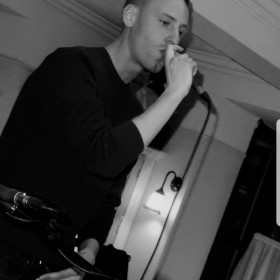STAGE PERFORMANCE & ANXIETY
As my chosen debate topic, I have decided to talk about stage performance anxiety. I feel that we as performers are faced with the over bearing task to stand out on stage. When new performers are gathering the skills and confidence to go out and entertain.
During my experience of performing, I have found there have been times I have walked away from a performance almost kicking myself! Sometimes, we are our own worst critics which is why I strongly feel the need to address this topic. I would like encourage beginner performers to further develop their confidence on stage.
A friend of mine who has never performed on stage before was asked about stage performance anxiety and replied that it would be very nerve wrecking to stand out in front of people and that he wouldn’t be able to do it. I think that this is understandable for a person who has never played an instrument or has any musical knowledge. While I’m sure that we all have to start somewhere for an absolute none musician stepping foot on stage would be difficult. I agree that performing can be nerve wrecking to begin with but by rehearsing and practicing there will be an improvement.
Whilst my guitar teacher who does perform quite regularly states that it can be quite easy once you get in the zone. This is all a big part of practice and experience. It can take a long time to get yourself to a performing standard. With the right amount of practise, dedication and patience you can achieve your goal. If you invest in yourself and your skill, you will soon see an improvement. I think that while my guitar teacher has had years of performing this could come quite natural to him as he has many years of experience doing it. It may look easy but that doesn’t always mean it is. There's a lot of precision and accuracy that is vital in keeping the beat and being on time, this sets the “zone” where once you're in a steady groove maintaining a rhythm should be easy. I think that my guitar teacher is correct when he talks about getting in “the zone” where you are in sync with the beat and feel the groove. Once you achieve this state playing becomes a lot more second nature to the point you don’t have to think about what you're doing as much.
A local musician at one of the open mic nights says that its natural to feel a little nervous before performing as these feeling can help drive our performance. If we performed and didn’t feel anything what would be the point in doing it? I agree, there’s certainly a thrill from entertaining it’s the excitement and joy of being able to express yourself through music. However, being nervous can also affect your performance in a negative way. If you're not enjoying yourself the chances are the people watching you will sense that.
Online documents such as “how to make performance an asset instead of a liability” state that whilst performing we experience feelings of fight or flight, a natural instinct to want to fight or avoid a situation. It is these feelings that we can use as a tool to drive our performance if used correctly
PH. D Noa Kageyama says on “How to make performance anxiety an asset instead of a liability”
Even more people experts included such as Dr. Brantigan believe that a moderate amount of anxiety is best, and that too much or too little anxiety is bad. This isn’t completely true either. What you want is to play your best, right? Reducing your anxiety or shooting for a moderate amount of anxiety will make you more comfortable, but not necessarily help you play better. This is why trying to relax isn’t the answer. What you need, is to learn how to control and channel your anxiety into more dynamic and powerful performances.
I think that this article is helpful, because it tells us that having a moderate amount of anxiety can be used in a positive way and it can help you, but getting too worried also can also destroy your performance.
I’ve found that in my conversations with others, that all their views relate to the fight or flight response, so it seems to make sense that people react in one way or the other – you either make it or break it – you run away because you’re scared or you own it.
Symptoms listed on webmd.com state that stage performance anxiety can come in many different ways and effect each person differently. Having said that people may have experienced similar yet different symptoms such as: Mind Block, Shaky Hands, Trembling voice, Volume Control, Racing Pulse, Rapid Nausea, Vision Changes.
It is safe to say while some of you may not have experienced all of these you are more than likely to have experienced some!
And the chances are you are not alone! Many people can relate over how nerve wrecking it can to be stepping on stage whether it be; Athletes, Musicians, Actors, or Public Speakers.
Does having stage performance anxiety make us bad performers?
I think that confidence is a big factor when it comes to entertaining, the things we go through in our personnel lives we either brush to one side or carry with us, meaning that we reflect those emotions whether it be good, happy, or sad. Therefor when feeling anxious it is possible that the audience may pick up on this. It is best that you keep your head held high and try your best no matter what!
Sometimes, when feeling nervous on stage you can use this as a tool to enhance your performance! As a drive for you to ignite your passion. If you are singing a song and feel sad at the time, you are going to help better convey that message through emotion. It is with this that we are truly able to connect with the crowd and gain a response. We want our message to be well received by the audience, So, we want to be as clear as possible through our actions and body language.
If you are singing a happy song, but have a hunched frame you may not give of the right image for the song you are singing, where as having a big smile and being loud and proud gives a more positive message, each person has their own unique of expressing their body through music and you just have to try and see what works for you.
You may also find that you could perform at some places more than others and become more familiar with your surroundings and feel less anxious, whereas performing at a new place in front of a new audience might be slightly more nerve wrecking as it's a new experience. Best bet it to feel comfortable in the space you're in.
My question to you: have you ever suffered from any kind of performance anxiety? Some of the things you might like to think about when answering this are:
What was the situation at the time?
How did it make you feel?
Is there anything you can do to better next time?
Think of these things and reflect on performances and try not to be too harsh on yourself. We’re so good at saying what we do wrong, try and pick out the things you do enjoy and you will soon notice things you begin to like about yourself and your performance.
https://www.webmd.com/anxiety-panic/guide/stage-fright-performance-anxiety#1
https://bulletproofmusician.com/what-every-musician-ought-to-know-about-stage-fright/
https://noisey.vice.com/en_uk/article/rpy5qm/performance-anxiety-lonely-the-brave








0 Comments